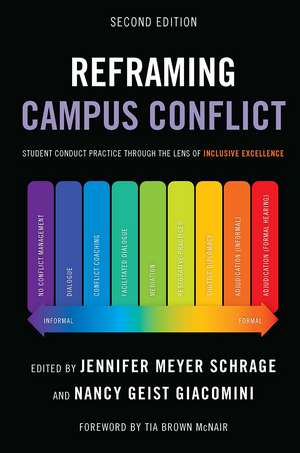Reframing Campus Conflict: Student Conduct Practice Through the Lens of Inclusive Excellence
Editat de Jennifer Meyer Schrage, Nancy Geist Giacominien Limba Engleză Paperback – 6 oct 2020
| Toate formatele și edițiile | Preț | Express |
|---|---|---|
| Paperback (1) | 249.53 lei 3-5 săpt. | +30.76 lei 5-11 zile |
| Taylor & Francis – 6 oct 2020 | 249.53 lei 3-5 săpt. | +30.76 lei 5-11 zile |
| Hardback (1) | 1169.48 lei 6-8 săpt. | |
| Taylor & Francis – 21 oct 2020 | 1169.48 lei 6-8 săpt. |
Preț: 249.53 lei
Nou
Puncte Express: 374
Preț estimativ în valută:
47.75€ • 49.57$ • 39.82£
47.75€ • 49.57$ • 39.82£
Carte disponibilă
Livrare economică 03-17 martie
Livrare express 15-21 februarie pentru 40.75 lei
Preluare comenzi: 021 569.72.76
Specificații
ISBN-13: 9781642670493
ISBN-10: 1642670499
Pagini: 430
Dimensiuni: 152 x 229 x 25 mm
Greutate: 0.8 kg
Ediția:2nd edition
Editura: Taylor & Francis
Colecția Routledge
Locul publicării:Oxford, United Kingdom
ISBN-10: 1642670499
Pagini: 430
Dimensiuni: 152 x 229 x 25 mm
Greutate: 0.8 kg
Ediția:2nd edition
Editura: Taylor & Francis
Colecția Routledge
Locul publicării:Oxford, United Kingdom
Public țintă
Postgraduate and Professional Practice & DevelopmentCuprins
Foreword—Tia Brown McNair Preface—Karen D. Boyd, Eleanor Moody-Shepherd, and James McFadden Acknowledgments Introduction—Jennifer Meyer Schrage and Nancy Geist Giacomini Part One. Responding to Conflict on Campus. Foundations for Student Affairs Educators 1. Transforming the Climate and Culture of Campus Communities Through Inclusive Conflict Excellence—Nancy Geist Giacomini and Jennifer Meyer Schrage 2. Reconciling Legal Obligations with Education Goals. Revisiting Foundations of Student Conflict Work—Simone Himbeault Taylor and Donica Thomas Varner 3. Why Objectivity is Not Nearly Enough. The Critical Role of Social Justice in Campus Conflict and Conduct Work—Ryan C. Holmes, Keith E. Edwards, Tamara L. Greenfield King, and Michael M. DeBowes 4. Creating a Community of Inclusive Excellence Using a Spectrum Model Approach to Campus Conflict—Jennifer Meyer Schrage and Monita C. Thompson Part Two. Pathways Within the Spectrum Model 5. Reviving Dialogue—Jennifer Meyer Schrage and E. Royster Harper 6. The Art of Coaching. Transferring Interpersonal and Group Conflict Resolution Skills to a One-on-One Setting—Nancy Geist Giacomini and Patricia M. Porter 7. Facilitated Dialogue. An Introduction and Overview for Campus Conflict Management—Jay K. Wilgus and Ryan C. Holmes 8. Models of Mediation Practice—William Warters 9. Restorative Justice from Theory to Practice—Andrea Goldblum 10. Negotiating Peace on Campus through Shuttle Diplomacy—Jennifer Meyer Schrage and Veronica Hipolito 11. Off Script. Incorporating Principles of Inclusive Conflict Excellence Into Informal and Formal Adjudication Pathways—Nancy Geist Giacomini, David R. Karp, Derrick D. Dixon and Valerie Glassman Part Three. Sustainable Innovation and Transformation 12. Cultural Responsiveness in Student Conduct and Conflict Resolution Assessment—Erik Wessel and Amanda Karel 13. Building Relational and Critical Thinking Skills. The Power of Peer-Led Restorative Justice Circles Among First-Year College Students—Sheila M. McMahon and David R. Karp 14. Culture, Conflict, and Student Learning. Intercultural Development for Global and Inclusive Graduates—Julio J. Cardona, Ramona Meraz Lewis, Nathan J. Hanke, D. Eric Archer, Mary Jo E. Desprez, and Donna M. Talbot 15. Keeping it Real. Reflections on Inclusive Campus Leadership and Authentic Collaboration—Tamara L. Greenfield King, and Leah A. MerrifieldAfterword—Nancy Geist Giacomini and Jennifer Meyer Schrage Editors and Contributors Index
Recenzii
“This book serves to equip educators to practically apply transformative justice in higher education. The authors challenge readers to critically self-reflect and critique both individual and institutional prejudice. As student conduct professionals we are accountable to the preservation of the landmark legacy of Dixon v. Alabama. We have a duty to speak authentically, promote equity, and lead with unshakable integrity. This book highlights a meaningful spectrum of pathways for healing hurt, repairing harm, and lasting community connectedness.”
Kateeka Harris
Association for Student Conduct Administration (ASCA) President-elect 2020
“This book reminds us that the goals of inclusive excellence are relevant now more than ever as we seek to innovate and reinforce the principles of dignity, honesty, civic virtue, democratic engagement, and scholarly discourse. Teaching and modeling peaceful and just resolution of conflict are foundational to graduating global and inclusive graduates across learning platforms and programs.
By providing deep theoretical foundations, a broad framework and implementation model for higher education with transferable K–12 and human resource management applications, and a thorough review of specific pathways for conflict resolution, educational leaders will find this to be an invaluable resource for years to come.”
Tia Brown McNair, Vice President for Diversity, Equity, and Student Success
Association of American Colleges & Universities
Kateeka Harris
Association for Student Conduct Administration (ASCA) President-elect 2020
“This book reminds us that the goals of inclusive excellence are relevant now more than ever as we seek to innovate and reinforce the principles of dignity, honesty, civic virtue, democratic engagement, and scholarly discourse. Teaching and modeling peaceful and just resolution of conflict are foundational to graduating global and inclusive graduates across learning platforms and programs.
By providing deep theoretical foundations, a broad framework and implementation model for higher education with transferable K–12 and human resource management applications, and a thorough review of specific pathways for conflict resolution, educational leaders will find this to be an invaluable resource for years to come.”
Tia Brown McNair, Vice President for Diversity, Equity, and Student Success
Association of American Colleges & Universities
Notă biografică
Jennifer Meyer Schrage, Nancy Geist Giacomini
Descriere
This fully revised and updated second edition builds upon the original vision of the first, which was to give voice to diverse and inclusive perspectives, identities, and practices and to enact the principle that student conduct and conflict response must be based upon foundations of social justice and restorative justice.
